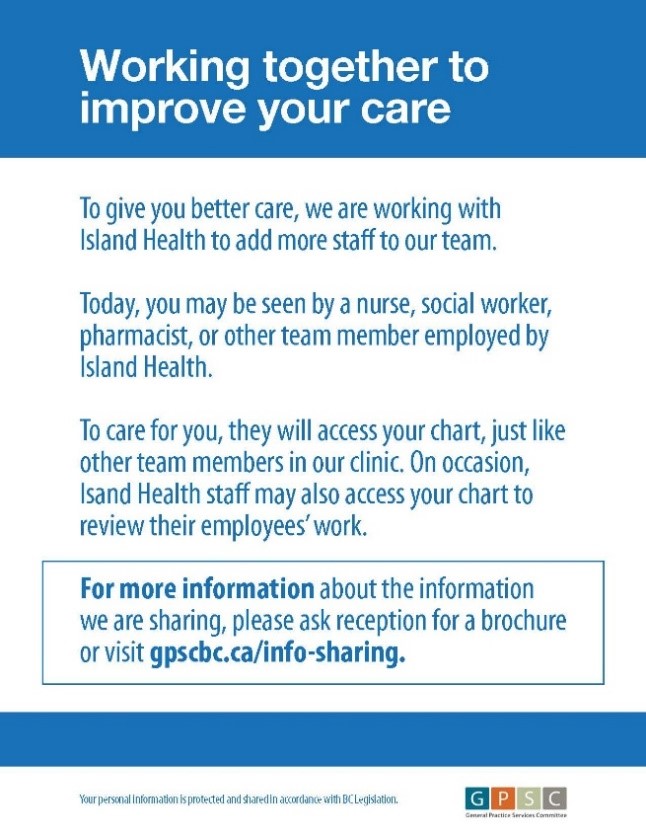Posted • Last updated
Categories: Patient Voice Mail, Working Together for Better Health Care

Throughout BC, the primary health care system is changing – and as part of that change, so are the role of patients, families and caregivers. Through a partnership with the Patient Voices Network (PVN), administered by the BC Patient Safety & Quality Council (BCPSQC), patients, families and caregivers are increasingly being sought out to be part of the team, not only in their own health decisions but at all levels of planning, delivery and implementation of BC’s health care system. Under the province’s Primary Care Strategy, there is a concerted effort for greater involvement at provincial, regional and local planning tables to support primary care networks (PCNs).
Layton Engwer, a passionate long-time advocate for including the voices of patients, has helped coordinate this evolution for patient partners. As a PVN member, Layton has participated in several committees including a local planning committee in his home community of Westshore on Vancouver Island. In his role as a member of the Primary and Community Care Advisory Forum, Layton saw a need to connect with other patient partners doing similar work across BC.
“I know there are about 4.9 million patients in BC,” said Layton, “I needed a way to connect with other patient partners working with PCNs to bounce ideas off and get more input.” Out of that need, he devised a plan, with the full sponsorship of the BC Ministry of Health, to reach out and find other highly motivated patient partners already involved in primary care to form a group called Primary Care Patient Voices (PCPV). “I wanted to find a way for many voices to be heard and have an influence on how PCNs are forming and working,” said Layton.
“I know there are about 4.9 million patients in British Columbia,” said Layton Engwer, “I needed a way to connect with other patient partners working with PCNs to bounce ideas off and get more input.”
In late 2019, the Council, through PVN, put out a call to patient partners with the criteria that they must currently be involved in primary care work in BC to be involved. Over 15 participants have joined the group with membership continuing to expand. Participants come from all regions of the province, each bringing a different perspective and value to the group.
Kelly McQuillen, executive director of Primary Care Planning, implementation and oversight for the ministry adds, “what we see from the experience of our patient partners is that they bring a broad depth of input.” True health system transformation requires going beyond public understanding to authentic engagement. “Patient voices and the communities they represent, need to be heard and present to influence change,” said Kelly. “For PCPV, it was important to establish structures and processes to support continuous engagement in PCNs.” The result is a self-governing committee that serves two main goals:
- Educate, discuss issues and review initiatives related to PCNs with patient partners
- Advance patient involvement and engagement in the progression of person- and family-centred care within primary care
The PCPV vision: Patients, families and caregivers are key influencers of how primary care will be provided, implemented and improved for their benefit and are responsible for holding the health care system accountable, as consumers of these services.
“We hope to be able to turn this into an ongoing, long-term group focused on primary care evolution,” said Layton. As PCPV continues to form, some ideas of where they can be involved in providing input include:
- Improving primary, team-based and person- and-family-centred care
- Advising primary care partners at a local, regional and provincial levels
- Providing a forum for members to learn and share experiences
- Sharing feedback on and ideas for, initiatives and programs that enhance and embrace the model of person- and family-centred care
- Being a collaborative, positive and rational force for the enhancement of high-quality team-based, person- and family-centred care
- Advancing patient involvement/engagement in the progression of person- and family-centred care principles and practices
PCPV continues to be routinely engaged on initiatives and programs that enhance aspects of primary care for patients. Most recently, PCPV was consulted by the General Practice Services Committee (GPSC) Information Sharing Task Group to provide input on a poster targeting patients. The task group engaged PCPV to provide feedback on how and what to best communicate with patients. The result is a clear, concise and direct poster that communities will see in their care provider’s clinic.

“The poster was very much patient influenced by the patient partners,” said Shana Ooms, the ministry’s executive director of Primary Care Strategy, policy and quality. “Where those of us in the room may have debated policy or wording, PCPV made sure patients were top of mind. And as a result, significant improvements were made to simplify something that was otherwise complex. Patient voices at the table brings us back to reality in terms of what we are trying to achieve.”
Supporting person- and family-centredness is an ongoing effort and a sustained priority for the Ministry of Health. Shana explains that having patients in the room changes the conversation, adding, “we tend to spend less time on value for providers and more time on value for patients. The solutions end up more patient-focused when you have patients in the room. Fundamentally, this changes how the conversation progresses.” Shana acknowledges both are important, adding, “we in BC agree with the quadruple aim philosophy that both provider and patient experience are important, however, we often neglect or do not make room for the latter.”
Patient engagement is a two-way street. Supporting meaningful involvement of patient partners is fostered through the continued partnerships between organizations such as BCPSQC, PVN and the ministry. Through its Patients as Partners initiative, the ministry also works to build engagement capacity by providing training to health sector staff, leading engagement sessions to support ministry priorities and providing free engagement tools and resources.
As the work in primary care evolves, Layton sees many possibilities for how PCPV can be supported. “We need ways to communicate, mentor and facilitate so that we can be successful, long-term,” said Layton. The ministry continues to work with PCPV to bring in facilitators and presenters to discuss a range of issues and topics – from service delivery models to compensation structures.
What’s clear is that this type of group shows promise in how to create connections, increase a more robust understanding of health care topics and provide a faster path to feedback from patient and family partners in British Columbia. Shana shares, “In this work we see glimmers of what is possible to shift to a person-centred system of care especially when we collectively experience something like COVID-19. That’s my hope for the future – that we start tipping toward person-and-family-centred transformation.” As advocates for patients and BC families, PCPV are key influencers on how primary care will be provided, implemented and improved for the better. We look forward to sharing more as the group evolves.
Author: Jami Brown, BC Patient Safety Quality Council and Hannah Glover, BC Ministry of Health

